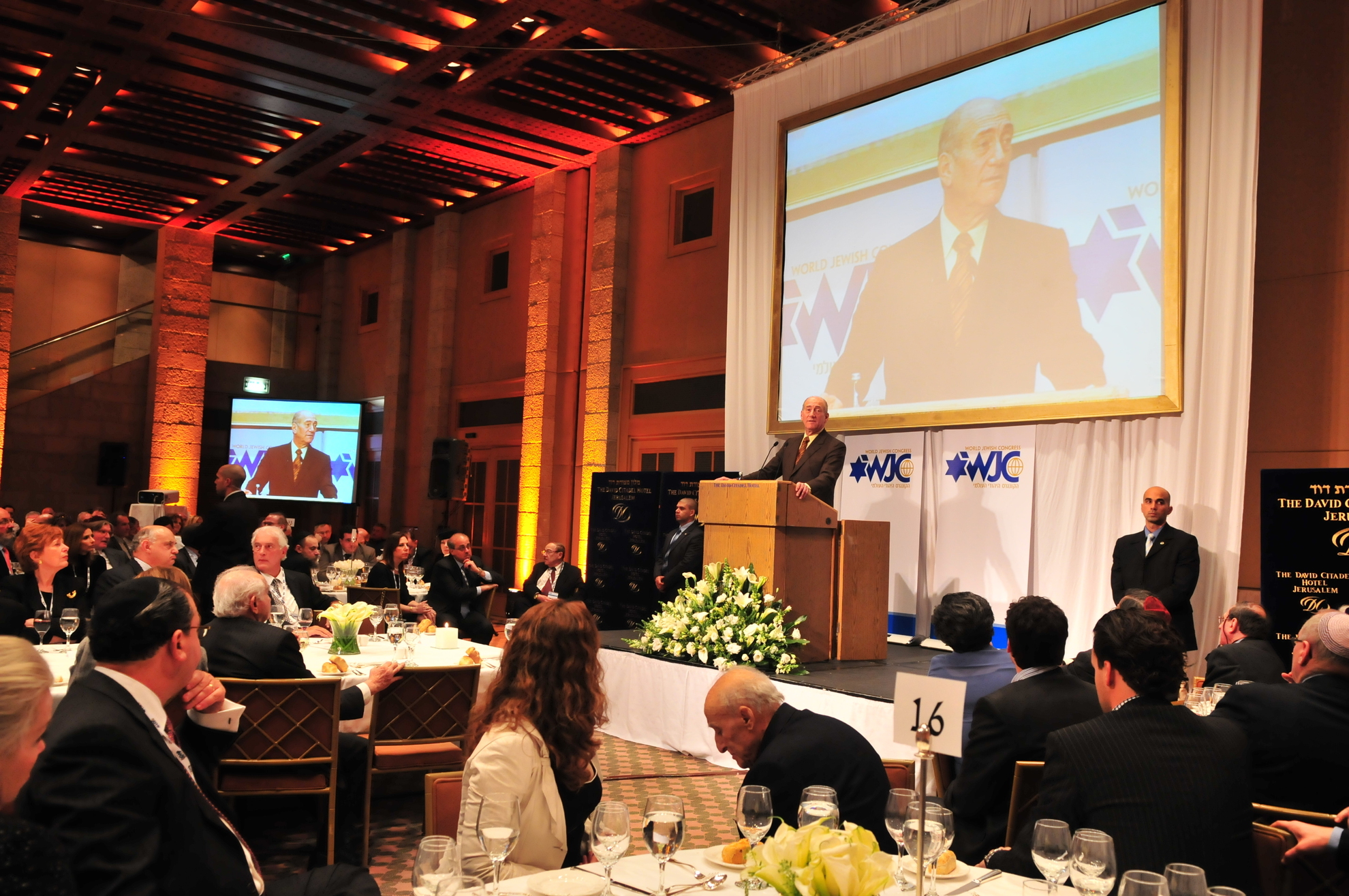Under the motto 'We Stand by Israel', the 13th Plenary Assembly of the World Jewish Congress was held on 26 and 27 January 2009 in Jerusalem. Over six hundred participants from more than 60 countries attended the gathering.
Several senior Israeli leaders spoke to delegates. At the opening of the gathering, President Shimon Peres said that Israel had the right to defend itself against thousands of rockets launched by Hamas militants in the Gaza Strip. “Instead of investing in the future of the Palestinian people, Hamas is buying arms to fight against Israel.” He reaffirmed that his country was ready to sign a peace deal with the Palestinians, but only on condition that their leaders renounce violence.
The president also criticized the “misrepresentation of facts" about the disproportionate number of Palestinian casualties in Operation Cast Lead. During the period from 2000 to 2009 there had been 5,792 Qassam rockets and 4,411 mortars launched from Gaza against Israel, the overwhelming majority in the last two years. "I don't know of any other country that went through such an experience," said Peres. Citing statistics of Israeli casualties of Palestinian terrorism, Peres said 842 civilians and 325 soldiers had been killed in recent years, making a total of 1,167 fatalities. "So where is the disproportion?" he queried, making the point that more than a thousand Israeli lives were lost in attacks from Gaza, in addition to others from attacks in the West Bank.
He also rebutted claims that Israel would not let in humanitarian aid to the people of Gaza. Peres said that 42,327 trucks transporting essential supplies had been allowed into the Gaza Strip. "The whole story of a siege is totally unfounded. There was never a shortage of fuel. There was never a shortage of food," he pointed out.
Likud chairman and opposition leader Benjamin Netanyahu said that Israel must not be divided again: “We have demonstrated in the past, and will continue to demonstrate our commitment to a complete, undivided Jerusalem,” the former prime minister pledged to delegates. He also said that if elected prime minister in the 10 February Knesset elections, he would expand existing West Bank settlements to allow for the "natural growth" of the communities.
Defense Minister and Labor Party leader Ehud Barak that Egypt could "dramatically reduce" Palestinian weapons smuggling along the Gaza border, and was now more inclined to act than before Israel's military operation in Gaza. "We have found that Egypt is much more ready to work seriously than in the past, and I am convinced that with enough energetic actions smuggling could be reduced dramatically," Barak told delegates. He said that Israel had destroyed about half of the "active" weapons-smuggling tunnels along the Gaza-Egypt border during the recent 22-day military operation in Gaza.
Diaspora Affairs Minister Isaac Herzog also addressed the assembly and called perceptions in the international media and among some Western governments that Israel had aimed its war at Gaza’s civilian population as “completely false”. He called on Jewish communities to help Israel to set the record straight.
Outgoing Israeli Prime Minister Ehud Olmert spoke at a gala dinner for delegates. He reiterated the need to make peace with the Palestinians, which for both sides would entail painful compromises. The recent military operation in the Gaza Strip had restored Israel's deterrence among its enemies and its perception of the whole world. "It is not worthwhile starting a war with Israel." The Israeli premier said that the 22 day-long attack on Hamas had been "essential, fundamental, and also successful."
"The lesson was taught which hopefully will change realities," he said. "Those who thought Israel was afraid of using power, would hesitate, and not have the courage now know we will not hesitate to use our force to defend our country."
Foreign minister and Kadima Party leader Tzipi Livni said there would be no compromise with Hamas. “Israel is going to act according to a new equation. We are not going to show restraint any more if we are attacked. We need to change the rules of the game until they [the Palestinians] learn that the rules have changed and the equation has changed,” Livni told delegates at a dinner. Livni said that Israel needed to negotiate with the Fatah-run Palestinian leadership in the West Bank towards a two-state solution, while continuing to fight against Hamas in Gaza. "For me an agreement with Hamas is not an option," she concluded.
Iranian threat and combating anti-Semitism top priorities of WJC
In special sessions on the recent surge of anti-Semitism world-wide, representatives from several smaller Jewish communities reported how Jews are increasingly coming under attack.
Former Mossad chief Efraim Haley said that "On the issue of Iran, the aims of the US and Israel are identical. If they [the US] want to try a different approach on Iran, we should not consider this as a threat, but as an opportunity." He noted that Iran was motivated by religion, but would do everything to ensure the preservation of its regime. "If they feel the regime is in danger, they will change their views," Halevy said, citing the Iranian decision to call for a cease-fire during the Iran-Iraq War after Saddam Hussein's then US-backed regime began bombarding Teheran with missiles.
Israel’s ambassador to Iran until the 1979 Islamic revolution, Uri Lubrani, that "nothing" would prevent Iran from attaining nuclear capabilities. Lubrani said that Israel needed to do "whatever possible" to prevent Iran from attaining nuclear weapons, but added that it was nearly "mission impossible."
"It is not a question of whether they will have it or not, but who is in charge and who will have the finger on the button," Lubrani said. He added that he did not envision any reason why the Islamic regime would want to forgo its nuclear weapons program when it was "on the threshold" of attaining a bomb, short of the Iranian people - backed by the West - taking action. “The current Iranian regime is on a war-path with the West,” he said.
Decisions by the Plenary Assembly
Delegates passed a number of resolutions. They expressed their unwavering support for the people and the State of Israel. The assembly also criticized the Vatican for revoking the excommunication of a Holocaust denier. After a debate on the upcoming UN anti-racism conference in Geneva (‘Duban II’), delegates adopted a motion which calls on all Jewish communities to lobby their governments in order to ensure that a repeat of the infamous 2001 Durban conference does not happen.
After a comprehensive review process, the Plenary Assembly also adopted a new constitution for the World Jewish Congress. The new statutes will replace the 1975 constitution and modernize the structures and decision-making procedures of the WJC.
Elections of WJC Officers
Ronald S. Lauder was confirmed as president of the World Jewish Congress. The 400 delegates unanimously re-elected the 65-year-old American businessman and former US ambassador to Austria. In his speech to delegates, Lauder emphasized Diaspora Jewry’s unwavering support for the State of Israel, especially in the face of threats by terrorist organizations. He criticized countries and international bodies such as the United Nations for applying “double standards” when it comes to Israel and not providing enough support.
Eduardo Elsztain of Argentina was elected the new chairman of the WJC Governing Board. WJC Secretary General Michael Schneider was also re-confirmed in his position. Cobi Benatoff of Italy became the new WJC treasurer. Delegates also elected the following Jewish leaders vice-presidents of the World Jewish Congress: Rabbi Yaakov Bleich (Ukraine), Helena Glaser (Israel), Robert Goot (Australia), Flo Kaufmann (Great Britain), Charlotte Knobloch (Germany), Thomas Kraus (Czech Republic), Tamar Shchory (Israel), Rabbi Marc Schneier (USA), and Mervyn Smith (South Africa).
Other WJC vice-presidents, appointed by the regional affiliates, are: Roger Cukierman, (France) for the European Jewish Congress, Moshe Ronen (Canada), for the WJC North America, Eduard Shifrin (Russia), for the Euro-Asian Jewish Congress, and Sara Winkowski (Uruguay) for the Latin American Jewish Congress. Delegates appointed as honorary WJC vice-presidents Alexander Bronstein (Russia), Matityahu Droblas (Israel), Lord Greville Janner (Great Britain), Yehiel Leket (Israel), Maram Stern (Belgium), and Kalman Sultanik (USA).
International Holocaust Remembrance Day
Led by WJC President Ronald S. Lauder, the 400 delegates commemorated the victims of the Holocaust at Jerusalem’s Yad Vashem Holocaust remembrance authority. On the occasion of the annual UN Holocaust Remembrance Day on 27 January, Latin American Jewish Congress President Jack Terpins kindled the Eternal Flame at the Hall of Remembrance. Shoah survivors Charlotte Knobloch and Kalman Sultanik, both vice-presidents of the World Jewish Congress, laid a wreath.
Prior to that, Holocaust survivor Roman Kent recalled in an emotional speech his horrible experiences at the Nazi camps Auschwitz and Gross-Rosen. Professor Yehuda Bauer of Yad Vashem pointed out that while there were always only relatively few perpetrators of crimes, it was the silent bystanders who determined if genocides could happen. WJC President Ronald Lauder said that Yad Vashem had always been the inspiration and driving force for his engagement in Jewish communal life, and that passing on the memory of the Shoah to future generations was the crucial challenge for today’s leadership.
The 13th WJC Plenary Assembly was called by WJC Governing Board meeting in Ashkelon in September 2008.



